Democracy is the common value of humanity, transcending borders and social systems, though its forms may be different, according to the specific conditions of a country. However, the objective of democracy, in all its different forms, is to promote people’s well-being; it should not be weaponized to justify hegemony. At the third International Forum on Democracy: The Shared Human Values held in Beijing on March 20, this was the essence of the dialogue among nearly 300 senior officials, former state leaders, and scholars from around the world.
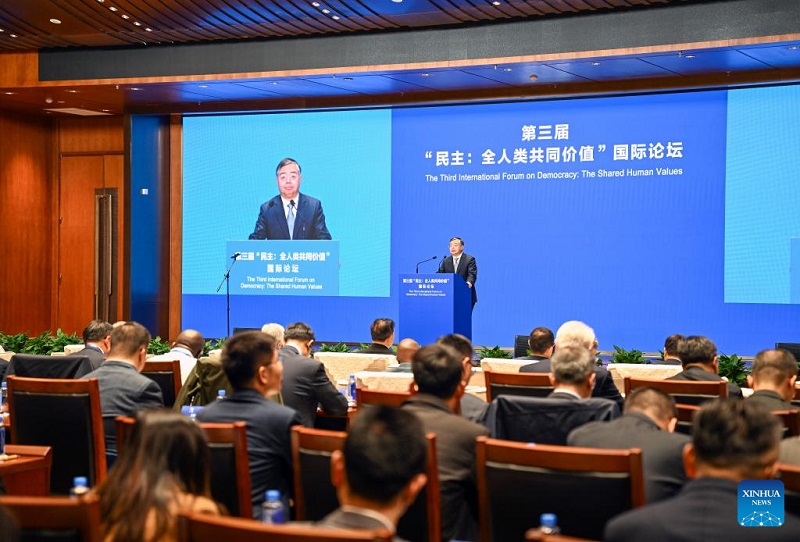
Li Shulei, a member of the Political Bureau of the Communist Party of China (CPC) Central Committee and head of the Publicity Department of the CPC Central Committee, attends the opening ceremony of the third "International Forum on Democracy: The Shared Human Values" and delivers a keynote speech in Beijing on March 20, 2024. (Xinhua/Zhang Ling)
Whether a country is considered democratic fundamentally depends on whether its people truly have the power to govern themselves, Li Shulei, head of the Publicity Department of the Communist Party of China Central Committee, pointed out in his keynote speech at the forum. “It’s not only about the verbal promises people get during the election campaigns but also about how many of those promises are fulfilled afterward.”
Du Zhanyuan, president of China International Communications Group (CICG), pointed out that democracy can’t be simply regarded as a mathematical formula with a standard answer. “It should be rooted and developed in the concrete conditions of a country, and not imposed by others following the so-called formula,” he said. Only the democratic path independently blazed by a country and formed in the process of solving its development problems can endure the test of society and history, he added.
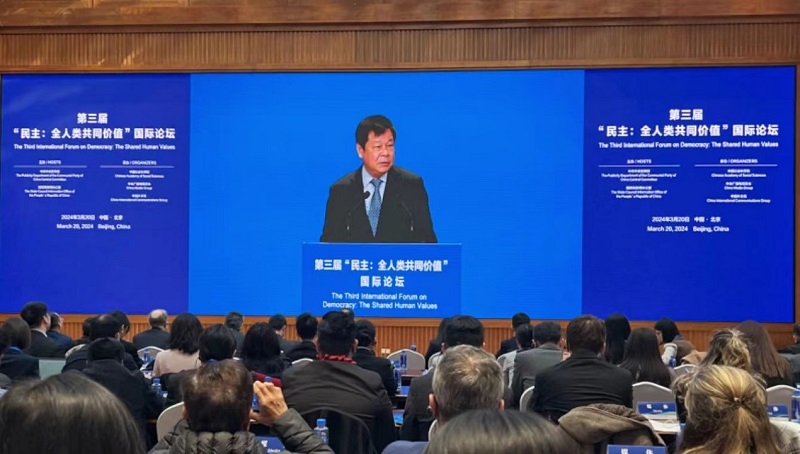
Du Zhanyuan, president of China International Communications Group, attends the opening ceremony of the third "International Forum on Democracy: The Shared Human Values" and delivers a speech in Beijing on March 20, 2024. Photo by Zhang Hui
The Academy of Contemporary China and World Studies, a think tank of the CICG, had conducted a survey in 23 countries across five continents on democratic practices and modernization in China. The findings of the survey supported Du’s view, with over 95.7 percent of the respondents agreeing that all countries should choose the path to democracy and modernization best suited to their national conditions.
The forum participants also called for reforming the international governance system for a fairer and more equitable international order. The influence of Chinese wisdom and traditional Chinese culture on democracy in both the East and the West was part of the dialogue as well.
True Democracy Should Work
Since democracy can take various forms, the different democratic systems and diversity of civilizations should be respected. The point was stressed at the forum, which also lauded China’s whole-process people’s democracy and unique path of development that had brought tangible benefits to its people.
“The survey found that the common values of humanity advocated by Chinese modernization, namely ‘peace, development, fairness, justice, democracy and freedom,’ have continued to gain recognition globally,” Yu Yunquan, president of the Academy of Contemporary China and World Studies, said at the forum. Over 90 percent of the respondents responded positively.
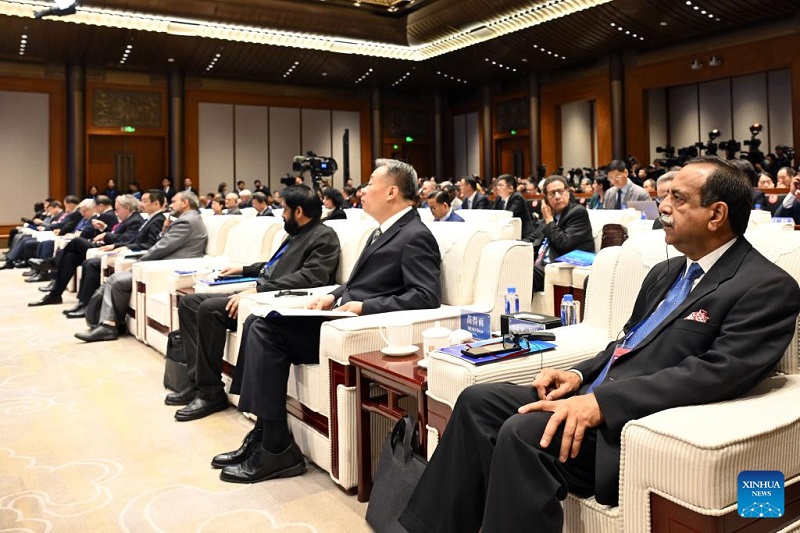
Guests attend the third "International Forum on Democracy: The Shared Human Values" in Beijing, capital of China, March 20, 2024. (Xinhua/Jin Liangkuai)
The China report of the 2023 Edelman Trust Barometer, an annual trust and credibility survey, found 89 percent of the Chinese respondents trusted their government, the highest among all the countries surveyed. In the U.S., only about 42 percent said they trust their government.
Democracy is based on people’s trust, said Georgios Katrougalos, former Foreign Minister of Greece. A survey by the Organization for Economic Co-operation and Development found that in Western countries, most people think that their government protects only the interests of the rich instead of promoting the well-being of the public, he pointed out in his keynote speech. The high trust the Chinese have in their government attests to how China has effectively addressed the concerns of its citizens and promoted the overall development of whole society, Katrougalos observed.
The Chinese narrative, supporting the diversity of democratic practice, sees a connection between people's aspirations and the level of social development. This is particularly important for developing countries as they have to give priority to the basic subsistence needs, noted Ong Tee Keat, former deputy speaker of Malaysia’s Lower House of Parliament.
“Many in the West think that democracy is a Western value. (But the Western model) cannot be exported and imposed in other parts of the world as the experiences in Afghanistan, Iraq and the Middle East have shown in recent years,” former Italian Prime Minister Massimo D’Alema said. “Our model of Western democracy has lost credibility and attractiveness.”
In the Academy of Contemporary China and World Studies survey, the respondents gave a higher evaluation of China’s state governance capacity, an important indicator assessing the effectiveness of democracy, according to Yu Yunquan. The average approval rate was 94 percent.
Call for More Democratic International Order
With the U.S. hegemonistic interference in international affairs fueling rising ideological confrontation and wreaking havoc in some regions, the call for the democratization of international relations is getting louder. It was heard at the forum as well.
In his video speech, Mauro Alboresi, general secretary of the Italian Communist Party, said it was time to reform the international organizations which were reinforcing U.S. hegemony in the global arena. The changing international situation demanded a change of the unilateral international order, he pointed out.
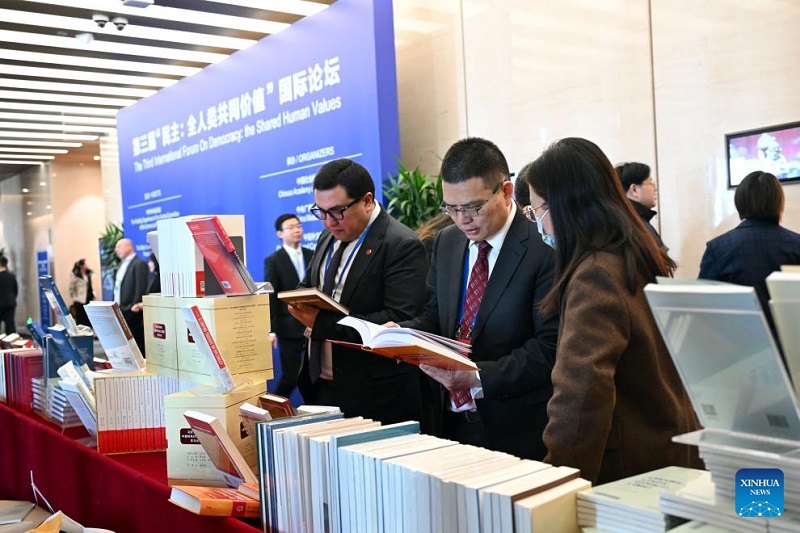
Guests read displayed books before the third "International Forum on Democracy: The Shared Human Values" in Beijing, capital of China, March 20, 2024. (Xinhua/Jin Liangkuai)
Former Thai Prime Minister Abhisit Vejjajiva echoed him. "In the last three decades, we have been unable to reform the international organizations that make up the system of global governance," he said in his video speech. "We don't have an effective or democratic system of global governance," he added, as he highlighted the deficiencies he thought required urgent fixing. "We have so many emerging countries and economies that are now very influential and more relevant to global affairs, yet continue to be underrepresented in these (international) organizations. It is time to correct this imbalance."
Many of the participants spoke about the need to build an effective and democratic global governance system in keeping with globalization and the changing world situation. Democracy is not only embodied in domestic governance but is also a principle of global governance. “The democratization of international relations is a value which should be embodied in a certain system and practice model,” said Chen Bo, president of the China Institute of International Studies. “To achieve democratization of international relations, we need to promote global governance based on extensive consultation, joint contribution and shared benefits.” This means the legitimate rights and interests of developing countries should be respected and their opinions and reasonable demands should be considered, she added.
Charisma of Chinese Wisdom
The Global Risks Report 2024, published by the World Economic Forum, presents a gloomy outlook for the next decade, highlighting the likelihood of social upheavals and high risks of global catastrophes as well as growing dissatisfaction with the continued political, military and economic dominance of the Global North.
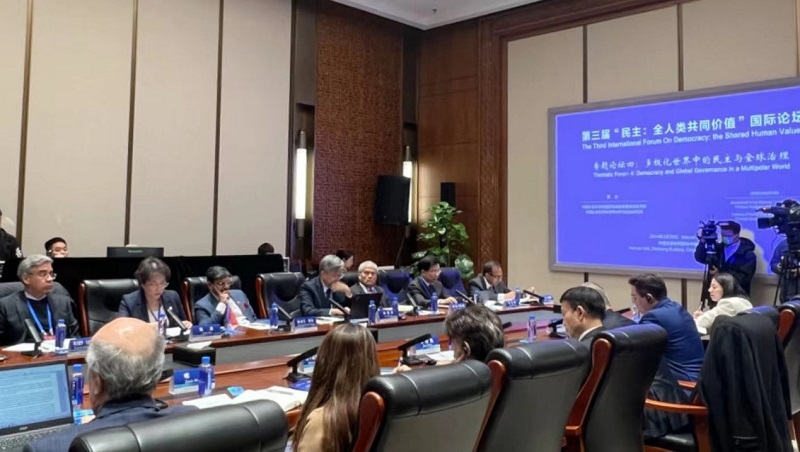
A parallel session themed “Democracy and Global Governance in a Multipolar World” at the third "International Forum on Democracy: The Shared Human Values." Photo by Zhang Hui
“Faced with this scenario, the Chinese government suggests a new approach to international relations and new ideas for global governance,” said Evandro Menezes de Carvalho, a scholar of the Getulio Vargas Foundation at the Fluminense Federal University, Brazil. He lauded the China-proposed concept of building a global community with a shared future, which, he said, was a departure from the old Western path of colonialism and hegemonism.
Carvalho traced the origin of the concept to the Chinese notion of harmony, a key term for understanding Chinese culture. “Harmony presupposes diversity and complementarity between different things,” he said, quoting Chinese President Xi Jinping: “Just as we do not expect all flowers to be violets, we cannot demand that countries with diverse cultural traditions, historical experiences and contemporary national conditions should adopt the same development mode. That would make for a dull world.”
The Academy of Contemporary China and World Studies survey shows that the international appeal of Chinese culture is more recognized, with an average approval rate of 92.8 percent, up 4.3 percent from 2022, Yu Yunquan told the forum. In developed countries, the respondents thought traditional Chinese culture is an important contribution to the progress of civilization.
Ong Tee Keat underscored the role of benevolence in state governance which was propounded by Chinese philosopher Mencius (372-289 BC). “(It) speaks volumes of the relevance of people-centric governance in ancient China even before the word democracy was being promoted,” he said. “This millennium-old wisdom now finds its resonance in the whole-process people’s democracy in China.” People’s participation and the results of governance matter most in the practice of democracy, he added.
Alfred Hornung, a member of the London-headquartered Academia Europaea, spoke about how Confucian thought has influenced the Western ideas on democracy. “(It’s) a case of history in which the collaboration between China, Europe, and America already was working… This is also the way in which (they) should collaborate in the 21st century.”